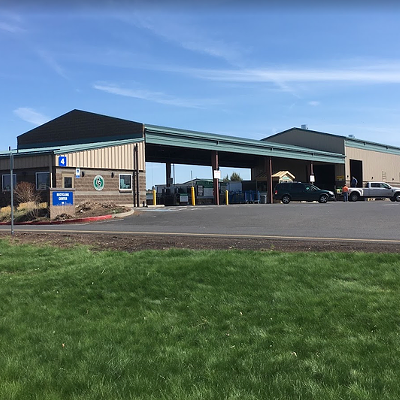At a recent public meeting, about 30 community members and a handful of children shared their dismay at the anticipated loss of de facto downtown park Troy Field. They urged representatives from the Bend-La Pine School District—who recently accepted a $1.9 million offer from an out-of-area developer—not to seek a removal of the existing public facilities designation.
"I think the public facilities designation should remain," said Jerry Olson. "I think we have enough multi-story, high-end condos. I'd prefer to see it serve the community."
Olson wasn't alone in that sentiment. Many of those present talked about the many ways the community uses the grassy area across from McMenamins. Jessica Born, director of the Bend Montessori School, said that the space gives her students an opportunity to get outside and play.
"We probably play in that field three times a week for 20 minutes at least," Born said, noting that the school is currently based out of the First United Methodist Church across the street. "It's been a really lovely place to have unstructured play."
But it's not just children who benefit from the open space. It also hosts annual community events such as the Earth Day Fair and Parade and the Memorial Day event.
For many, it was less about the field's uses than its role as the last remaining open space in downtown Bend. Concerns about that loss were heightened by the fact that the City's Heritage Square plan—which would transform the parking lots between the school district offices and City Hall into a town square have been stalled for years.
"I've seen good cities and I've seen great cities," commented former lobbyist and developer Marilyn Coffel, "but I've never seen a great small city without a public plaza."
Brad Henry, chief operations and financial officer for Bend-La Pine Schools, noted that Brownstone Development has expressed support for the Heritage Square concept. In those plans, Troy Field doesn't remain green space, but instead becomes a mixed used development with retail and housing. Instead, the current parking lot between the district office and City Hall would become a grassy lawn.
"At a staff level, there has been some conversations with the school district leadership on opportunities to revive the Heritage Square concept," says City Manager Eric King. "The goal would be to partner in funding a conceptual plan that addresses the school district and City needs as well as the broader context of downtown Bend including commercial, parking, and open space, and how best to program and locate those identified needs."
However, King noted that no formal action has yet been taken by either the City Council or the school board.
Even if the development of Troy Field could be leveraged to advance the Heritage Square concept, some raised concerns about the cost to the public—both financial and social—involved in selling off the property for commercial use, rather than preserving it for public use.
The City of Bend was the only public entity to make an offer on the property. After its initial offer of about $1.1 million was rejected, the City came back with a much more generous offer of $1.7 million—just $200,000 shy of the Brownstone Development offer ultimately accepted by the school district.
To move forward with the development, the school district and Brownstone will have to petition the City to remove the public facilities designation. Changing that designation will cost more than $14,000 in fees alone.
"The Planning fee for a General Plan map amendment is $12,265. Engineering fees are $1,955," King explains. "The district will have to hire some planning and engineering professionals as well to compile the information needed to address the approval criteria."
Nunzie Gould said that those costs ought to fall to the developer, not the taxpayer-funded school district.
Many of those present shared the sentiment that the public ought to be given an opportunity to buy the field, whether through a schools bond measure or outright. One woman in attendance even did the math, figuring that if Bend's population is about 80,000, each resident would only need to contribute $23 to match the $1.9 million offer.























